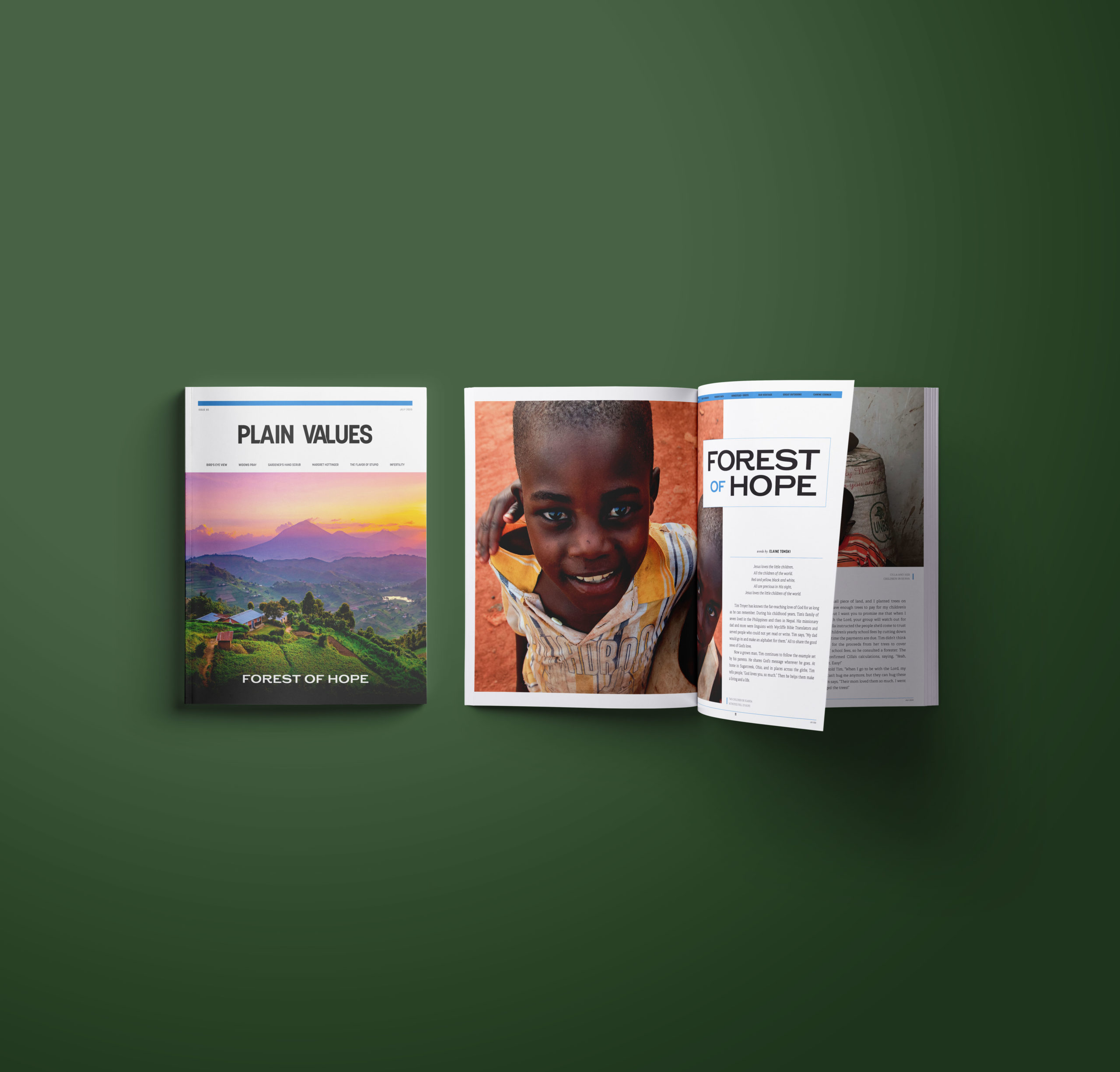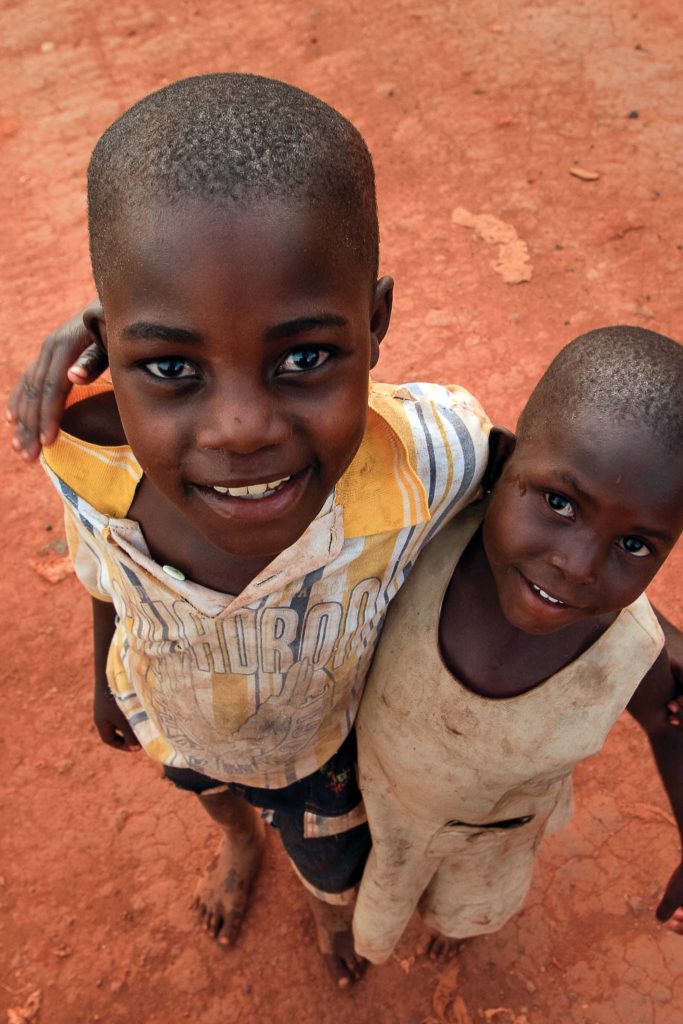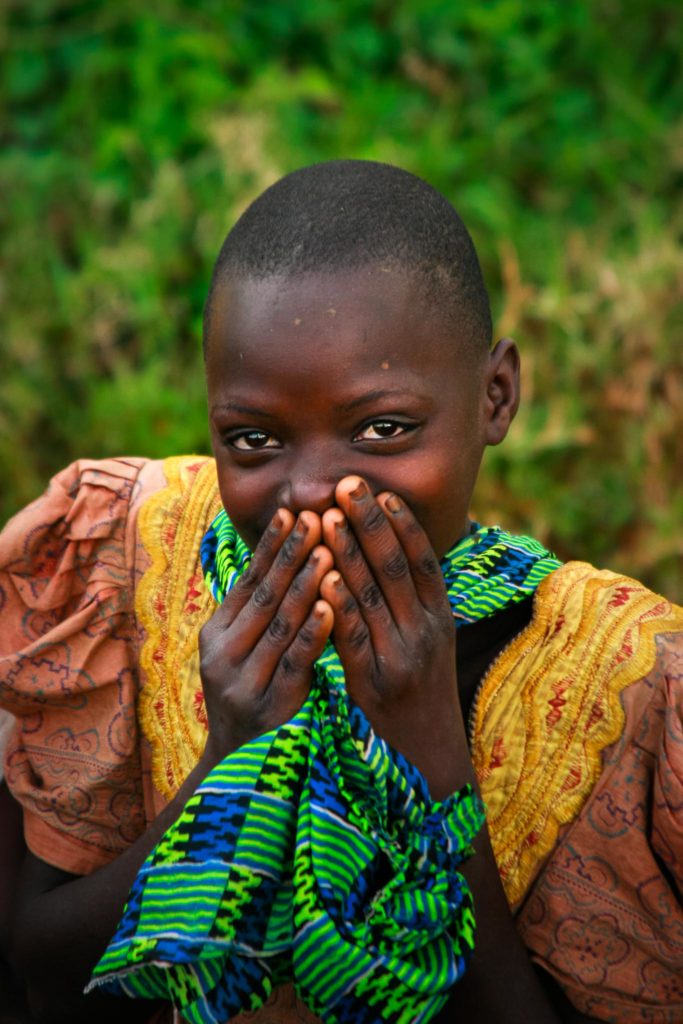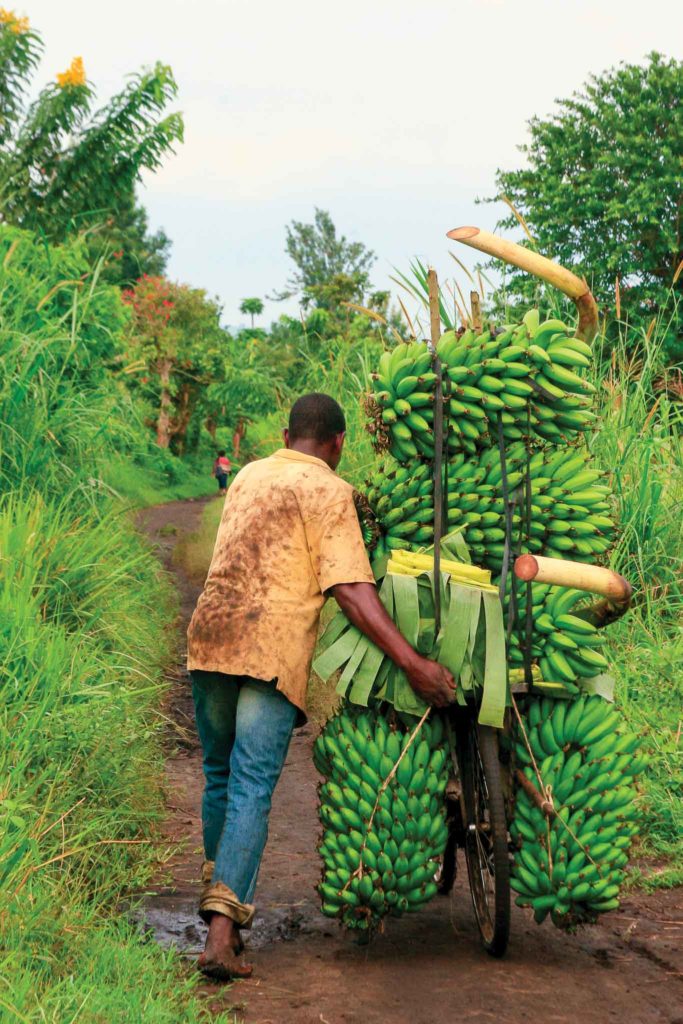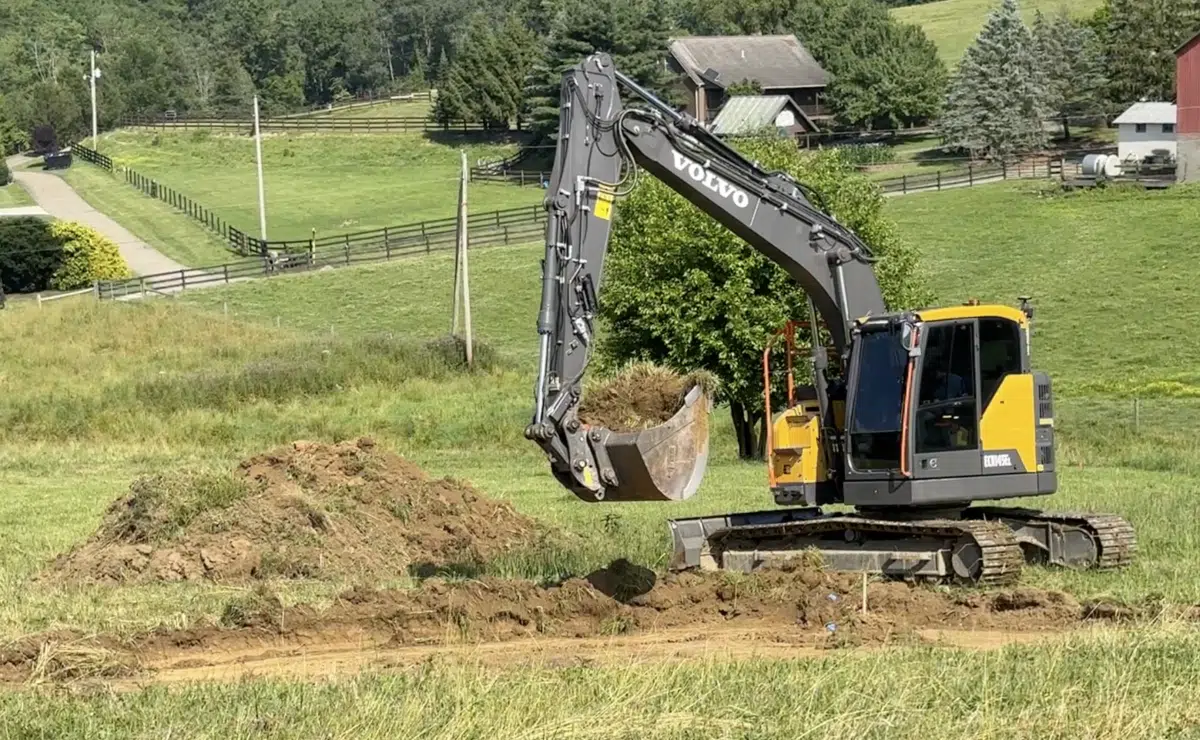words by: Elaine Tomski
–––––––––––
Jesus loves the little children,
All the children of the world.
Red and yellow, black and white,
All are precious in His sight,
Jesus loves the little children of the world.
–––––––––––
Tim Troyer has known the far-reaching love of God for as long as he can remember. During his childhood years, Tim’s family of seven lived in the Philippines and then in Nepal. His missionary dad and mom were linguists with Wycliffe Bible Translators and served people who could not yet read or write. Tim says, “My dad would go in and make an alphabet for them.” All to share the good news of God’s love.
Now a grown man, Tim continues to follow the example set by his parents. He shares God’s message wherever he goes. At home in Sugarcreek, Ohio, and in places across the globe, Tim tells people, “God loves you, so much.” Then he helps them make a living and a life.
Tim, the founder of The Reckoning International (TRI), along with a group of like-minded individuals, helps people overcome poverty with opportunity. TRI began in 1998 in Nepal. With the help of partners and donors, TRI redeemed 150 people from slavery, taught them to live in freedom, and showed them how to make a living.
TRI has partnered with people in impoverished areas of Central America, Ukraine, Uganda, Burundi, Kenya, Egypt, Columbia, and Brazil. They teach soil and land management to challenged farmers, provide Proverbs principles for the character training of communities, and partner with impoverished people to create sustainable businesses and a cycle of generosity, just to name a few.
- Curious children.
A SURPRISE IN KENYA
Forest of Hope began as a project of TRI, but it was a wise widow in Kenya who gave them the idea. Tim says, “So many poor people have great ideas, but they don’t have the resources or courage to try.” The widow, Cilla, had a fantastic idea. TRI brought the resources. And God supplied the courage. Let’s see how it all unfolded.
When Tim first met Cilla, she was sick and destined to stay that way. Infected with HIV/AIDS by her unfaithful husband, then widowed, Cilla was a mother unable to afford many necessities, including her medications. She needed help for herself and her three fatherless children.
Tim assured Cilla, “God loves you so much!” Tim wanted to help her find a way out of her poverty. Cilla replied, “I’m a widow; what can I do?” Tim said, “Well, according to the Bible, I’m supposed to encourage you to get married, or work, become a businesswoman. Which do you prefer?” Cilla laughed. “I’ve already been married,” she said. “It’s time for me to be a businesswoman. But I’m tired all of the time.” Tim reassured Cilla that God wanted to help her and wouldn’t ask her to do something she couldn’t do. Tim said, “You seem smart to me. I think you’ll do great!”
Cilla thought Tim was funny, but she trusted him. So, TRI gave her some business training and loaned her thirty-five dollars. Cilla started a small one-room shop in her house. Tim says, “She was able to get her needs met and her health back. She could even pay her kids’ school fees.” Finally, Cilla was able to pay the thirty-five dollars back, and TRI loaned it out to another person.
Cilla had received only three years of education in her lifetime, but that didn’t keep her from being wise. She realized God had been kind to her. Many of her problems found a resolution, but a huge one still bothered her. She came to Tim and said, “You know, I’ve been thinking about it. If the Lord tarries and there’s not a miracle, I’m going to die from AIDS. I’m at peace, and I’ve forgiven my husband, but the thing I worry about is my children.”
Cilla had a plan, but she needed someone willing to carry out her wishes in her absence. Cilla told Tim, “I have a small piece of land, and I planted trees on my land. I have enough trees to pay for my children’s education, but I want you to promise me that when I go to be with the Lord, your group will watch out for my kids.” Cilla instructed the people she’d come to trust to pay her children’s yearly school fees by cutting down a tree each time the payments are due. Tim didn’t think it possible for the proceeds from her trees to cover the cost of school fees, so he consulted a forester. The forester confirmed Cilla’s calculations, saying, “Yeah, she’s got it. Easy!”
Cilla told Tim, “When I go to be with the Lord, my children can’t hug me anymore, but they can hug these trees.” Tim says, “Their mom loved them so much. I went and hugged the trees!”
Tim claims the best ideas come from impoverished people. He says, “It’s like the Lord led us to Cilla because we weren’t smart enough to figure it out.” Tim and the people of TRI have watched this truth lived out. He says, “Just receiving donations can hurt people instead of helping them. People don’t need a hand-out; they need a hand-up.”
Tim wondered, How do we generate resources there? What do they have? The answer is soil. What do they lack? Trees. So, TRI bought some land in Kenya and started planting trees. “We figured we could plant maybe twenty trees to pay for one orphan’s entire education through the first year of university.”
Tim’s mom had been praying for a woman she could support. Using more than $400 of saved change, she helped a Kenyan woman plant five acres of trees. When those trees were ready for harvest, TRI bought the trees and the land from the Kenyan woman, then turned around and bought thirty-five acres of land in Uganda. “Let’s start planting some trees and doing the same thing. There has to be a way to generate money in Uganda for Ugandans.”
Forest of Hope had taken on a life of its own, so TRI applied for a separate 501(c) (3) license. They established a new board, hired consultants, and began to seek donors. The Forest of Hope model is simple. “Trees are planted. And the generated revenues upon harvest are used to pay for the school fees of orphaned and fatherless children.”
TREES FOR UGANDA
“In the next fifteen years, the future of Uganda actually depends on trees,” says Tim. “Otherwise, it goes the way of Haiti. Deforested.” Poverty has created a shortage of trees in Uganda, and it will only get worse if people cannot grasp a vision for the future. Tim explains, “The poor spend up to fifty percent of their income for fuel to cook their food. Saving indigenous trees doesn’t mean anything to hungry people. They will cut down a tree to cook their food to survive. They lack vision past their next meal.”
The vision Forest of Hope brings to Uganda focuses on education for orphans and the reforestation of a nation. As in Kenya, school in Uganda is supposed to be free. Still, many in poverty cannot afford school fees. Therefore, families might send only one boy to school. Or they may send a different child to school every year, requiring the others to sit out.
Tim came to know the little girl of a widow living next to one of their Forest of Hope properties. He says, “She is a precious, precocious, cool, little girl. Her mom has helped us plant trees.” However, her mom didn’t have enough money to pay school fees for both of her school-age children. She said, “They are expensive, very expensive!” That year, she could only afford to send her son to school.
A week into the school year, Tim asked their Ugandan executive director to find out the cost of fees. He returned to Tim with tears in his eyes. This poor woman could not afford to pay the shillings equivalent to twenty American dollars. Tim said, “We’re always careful with finances (not giving handouts), but this was our neighbor girl. This is what we do; help kids go to school. God has a plan for this girl. Why delay?”
On the night before they were to go home, Tim stopped by the neighbor’s house. He said, “We love you. You’re a neighbor who’s always there for us. We want to invest in your daughter’s life. Here’s the money for her school fees.” Tim says the widow shouted like a kid at Christmas, and the girl was jumping up and down, “hugging her mom and hugging us.”
The next day, the little girl gifted Tim and his crew with a large basket of hand-roasted peanuts from their family garden. Tim will never forget what she said. “I wanted to go to school so badly! I was jealous. I got sadder every day. Thank you so much!” Tim says, “One of our donors, ProVia CEO Brian Miller, was there with me and got to see what we’re sowing into. We were part of something so big for such a small amount!” Today, that intelligent little neighbor girl achieves some of the highest grades in her school.
Tim believes people in the United States become overwhelmed by poverty. He says, “I tell people all the time, poverty is not a big problem. It’s not! It’s a hive of tons of little, tiny problems, of twenty-dollar problems.”
TRANSFORMING THE MIND
“Ideas have consequences,” says Tim. In Central Africa, there are over three hundred language groups. Until a generation ago, there were no words in any of these languages to describe the future because they revere the past. Tim says, “They worship their ancestors and tell stories of how ancestors could just walk outside, reach up, and pull fruit from the trees to eat. They say, back then, animals were friendly and could talk. They believe they’re moving farther and farther from the ideal.” In our Judeo-Christian world view, we envision a glorious future and strive to do better. But many Africans believe life will only get worse.
When we expect the worst, we may not act the best. The people of Forest of Hope experienced some of the worst after they bought thirty-five acres in Uganda. They encountered squatters, people who settled on the land without right or title to it. Five dishonest, cunning, and conniving people had buried the bones of their ancestors on sections of land they did not own to claim possession of it.
As the land for Forest of Hope was surveyed, the squatters became irritated. When Tim’s assistant, Jamada Simewa, went to work on Forest of Hope’s legally purchased land, the squatters attempted to kill him. So, Forest of Hope had their property surveyed again, just to be sure they were within their rights, and not infringing on anyone else’s rights. Even more irritated, the squatters tried to take Jamada’s life again.
Tim says, “We didn’t know what to do. These were poor people, and we felt sorry for them, but this was not their land. What would the Lord want us to do? We want to plant trees here to help people NOT be poor.” “So,” Tim says, “We called in the village elders, police, and officials.” Jamada addressed the squatters in the presence of witnesses. Jamada said, “I could have you arrested because you tried to kill me twice. Instead, we will give you the land. We need to move some of you because you’re right in the middle of the field. But we will give you the deed to the land if you move to the plots we survey for you. And, if you sell the land, you must give us the first opportunity to buy it. In fact, we’ll buy it now.”
Two crafty squatters took the money right away. One lady has since passed away, and her daughter sold the land back to Forest of Hope. Tim says, “The main one, the ringleader of the murderers, was so thankful. He couldn’t believe it! He had the deed!”
Within a year, the ringleader became seriously ill. Jamada stopped to visit, supplied medicine, and prayed for him. Tim says, “Ten days later, the guy called Jamada to say, ‘I’m fine! Here I tried to kill you. And yet, while I was on my deathbed, you came to give me medicine and prayed to your God for me. I will always be grateful to you for all you’ve done.’ ” A man without hope has received hope because Jamada gave him an example of God’s forgiveness and love.
FROM PLANTING TO HARVEST
Forest of Hope has planted an estimated 30,000 trees on their thirty-five acres in Uganda. They grow eucalyptus and cypress trees, which are quickly ready for harvest. Tim says, “They grow really fast because there’s no winter. The trees go through two growing seasons, instead of one, each year. In just six to eight years, the trees are ready for harvest.”
Tim adds, “You plant them pretty tight, then they grow to a certain point, and you thin them. The first trees taken out are for construction poles. Then the other trees grow bigger.” Tim is excited because 2020 is the first year of harvest for Forest of Hope in both Kenya and Uganda. The construction poles will be sold and used for scaffolding. When the remaining trees are big enough, they’ll be harvested and sold to the government as telephone poles. Also, Tim says, “Foreign buyers will buy timber, or we can take them to our sawmill and cut them into boards for more than we can sell the tree.” Tim’s goal is to use the offcuts for charcoal, and extract oil from the eucalyptus trees. He says, “Harvest and plant. Harvest and plant. Keep the cycle going.”
The hope is also to keep the operation growing. Tim says, “Uganda has three million orphans, and the country is a little bigger than Arizona. Compare that to the United States, where we have between 400 and 450 thousand orphans.”

GENEROSITY
“Pure religion and undefiled before God and the Father is this, To visit the fatherless and widows in their affliction, and to keep himself unspotted from the world” (James 1:27).
In God’s economy, generosity doesn’t have anything to do with the surplus. It has everything to do with a way of life. Tim tells of a little girl with eight dollars who chose to give it all. Eight dollars was all Tim needed to redeem a 65-year-old man from slavery. Just eight dollars freed a broken down, worn out, third-generation slave who could not read, write, or spell his name. All he could do was count to five. Thank the Lord for a generous little girl who could count to eight and gave it all away.
Tim says, “You don’t need a lot of money.” Think of the neighbor girl in Uganda who went to school because of generosity. “You need twenty bucks. I can buy a pizza for twenty bucks! So, what’s stopping me from changing the world?” $20 = 20 trees = 1 educated, grateful, generous, child. “At Forest of Hope, we want everyone to live in a cycle of generosity fueled by God’s love. The opposite of poverty isn’t riches. It’s generosity.”
Forest of Hope partners with people poor in the eyes of man. God sees these same people as rich in faith. They don’t label the people they help as clients, but rather partners. Tim says, “We’re in a partnership, needing change as much as they do. We have possessions, but they have a lot of spiritual wealth.” Tim tells their African partners, “You have something to give to our donors, and that’s your love and your prayers.” Tim says, “They pray for our donors and ask me about them by name.”
“We do it together,” says Tim. Donors give, people receive dignity through work, partners pray, and all find meaning for their lives in the process. Forest of Hope demonstrates how giving is part of the rhythm of life. They teach their partners to dig a hole, plant a tree seedling, and watch it grow to provide for the future. Tim says, “Look at your feet, and you can only see the days’ end. But lift your eyes, and you can see ten years from now. We tell our partners; the goal isn’t just for you to become self-sufficient and prosper. We want you to produce more than you consume. Then save, and give. Make as much as you can, save as much as you can, and give as much as you can.” It’s a lifestyle of generosity, no matter how small or large the paycheck.
THE HARVEST
The first round of cut trees will soon provide shillings for school fees. The orphan problem may seem vast, but Forest of Hope is doing what God has called them to do. Now, just nine years after planting the very first trees, a group of widows helps oversee the projects and advise the distribution of funds, and partners with educators for the future of orphaned and fatherless children in their communities.
“Generosity is the solution,” says Tim. Generosity changes a person’s mind and heart, providing a vision for the future. “The value of an individual comes from realizing your purpose.” And a purpose is given to each child from our Loving God.
God loves his children no matter their age, gender, nationality, or skin color. Orphan, widow, sick, or healthy, in His Spirit, all are wealthy. Jesus died for all the children of the world.
If you are interested in donating toward the purchase of trees, please contact Forest of Hope.
Forest of Hope
P.O. Box 422 // Berlin, OH 44610 // (330) 763-4786
Visit www.thereckoning.org/forest-of-hope for more information.

